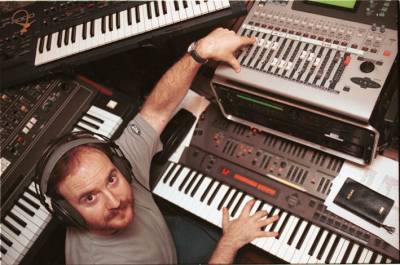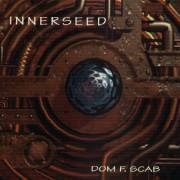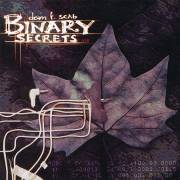DOM F. SCAB
Interview conducted by Jorge Munnshe
Dom F. Scab is a brilliant composer, capable of dealing with unsurpassed skill the technological media available to him. By combining digital sonorities with analog ones, he knows how to shape a personal style of electronic music that links to the most thrilling essence of the Space Sequencer Music that so much enthusiasm awakened during the seventies to an audience wishing for new sensations, and that nowadays enthusiasms the new generations as well. His style, nevertheless, has many elements typical of the eighties and the nineties. He has been compared to the Tangerine Dream of the early eighties, yet even if it will appeal to those who enjoy the music this band used to make in that time, his music turns out to be completely personal.

Could you tell us how your vocation as a composer started? And your interest in electronic music?
I guess that with the purchase of my first electronic instruments. I used to play the piano from a very early age, but when I discovered the possibilities offered by synthesizers , a new dimension opened before my eyes. By then, and I am speaking about some eighteen or twenty years ago, my favourite music was Symphonic Rock, and also some Jazz. I came to discover Electronic Music as I was creating my own. As soon as I first listened to "Stratosfear" of Tangerine Dream, my vision of music changed. Then came "Rubycon", "Phaedra", the works of Klaus Schulze, Vangelis, etc... What fascinated me most of this style and form to understand music was the creation of sounds that I had never heard before, and of course, of this new way to develop the composition without ties or tight
constraints.
Which are the main differences in your creative process when you are working with other composers? Or is the process basically the same as in your solo works?
There are some differences. Working with other musicians is somewhat like a marriage because one needs to know how and when to concede, at times, and try to have some balance. In my manner of working there is a fairly great component of improvisation, so I try to see the contribution of a colleague as a part of this chance that is created in every process of improvisation. Anyway, at a studio level, I prefer solo work, although I admit that when performing live, I'd rather be surrounded by other musicians.
Do you think there is a clear relationship between science fiction and some given stylistic trends within music?
I like Sci-Fi a lot and I believe that this feeling is present in my music. Yet, Electronic Music is not necessarily related to Science Fiction. What happens is, both concepts have clear connotations of imagination, of abstraction. And the sounds that can be extracted from a synthesizer can help to re-create impossible landscapes, unreal ambiences, etc...Don't forget that one of the best Sci-Fi soundtracks of all times is basically constructed with synthesizers. I am referring to "Blade Runner", of course.
 With
"Innerseed" and "Binary Secrets", did you try to communicate some message or to shape, in the form of music, some of your ideas about the topics the titles of these albums are related with, as well as the pieces included in them?
With
"Innerseed" and "Binary Secrets", did you try to communicate some message or to shape, in the form of music, some of your ideas about the topics the titles of these albums are related with, as well as the pieces included in them?
Yes, of course. There is a common nexus between both albums, which is the relationship between technology and life, between the machines and nature. This is what I have tried to transmit. Although I must insist that one's proposal needn't coincide with the imagination of the listener."
Some instruments are already legendary in the history of electronic music. You own one of them. Tell us what it is that attracts you most, as a musician, of your Yamaha CS-80.
No doubt, the enormous expresivity it has. You can play the same note a million times, it always has a different shade. This, together with its fabulous sound, makes of the CS80 a unique instrument. There is another important ciscumstance that is, not having midi and being unable to communicate with the sequencer, I have to play and record it as I would do with a piano, with all the impurities that there may be, and this makes the composition to become all the more humanized. Nowadays it is an essential part of my studio.
Can you tell us some anecdote about your experience playing live?
 I could tell you a great deal, yet perhaps the most surrealist one happened during a concert together with Albert Gimenez during the festivities of the Mercè in Catalunya Square, in Barcelona (Spain). We had been hired, but what we didn't know was, the rest of artistic performances before and after ours were of a traditional folk kind, and the fact that the audience was, in a vastly major part, senior citizens. It was a disaster. The poor old people covered their ears and made gestures with their hands, like when your grandma tells you, "child... lower the volume of the television". When we finished, an old man came to us, with a hallucinating face, telling us he had found the concert truly wonderful, and asking us where he could get our albums.
I could tell you a great deal, yet perhaps the most surrealist one happened during a concert together with Albert Gimenez during the festivities of the Mercè in Catalunya Square, in Barcelona (Spain). We had been hired, but what we didn't know was, the rest of artistic performances before and after ours were of a traditional folk kind, and the fact that the audience was, in a vastly major part, senior citizens. It was a disaster. The poor old people covered their ears and made gestures with their hands, like when your grandma tells you, "child... lower the volume of the television". When we finished, an old man came to us, with a hallucinating face, telling us he had found the concert truly wonderful, and asking us where he could get our albums.
What do you think about the attitude that some purists of acoustic instruments hold before synthesizers, which they find "lacking in human warmth" as well as inexpressive?
In general, I have the impression that they show an attitude of fear and rejection. I only coincide with them in the fact that a synthesizer will never replace an acoustic instrument. This is not its function, although manufacturers insist on filling them with “presets” of pianos, guitars and trumpets. The terrain a synthesizer must explore is the creation of new, unreal sounds, sounds that do not intend to imitate anything already known. And at a level of pure expressivity, a synthesizer can be as expressive as an acoustic instrument. Anyway, the coldness would lie in the composition itself.
In your opinion, have the analogical and the digital sound different personalities?
Certainly, yet I am a true defender of the former, as it tends to occur with some synthesists. In your previous question you were inquiring about "purists", and in the controversy analogic vs. digital these "purists" are present as well, I think that, as you well say, they have different personalities, and this circumstance makes them become wholly complementary To emphasize the virtues of one you need to combine it with the other.
Tell us about the projects you are working on and your future plans.
In this moment I am waiting for my new CD, "A-con (Analogical Confessions)", to be released. I guess it won't be long for that. It somehow represents the continuation of my previous work, "Binary Secrets",. and so I have chosen to play a little with the title. I will surely start to work on a new album soon, together with John Lakveet. With respect to concerts, I am working now on a project in a trio format, together with Odracir Lavid (midi guitars) and Jose Maria Zyrya (drums and electronic percussion).On December 14 we will be in the auditorium Barradas de L'Hospitalet. It can be, I believe, an interesting experiment that will combine different styles, like say, electronic, jazz, world
music...
If you wish to purchase any recordings by Dom F. Scab you only have to use
this link.
More info about Dom F. Scab here: http://www.domfscab.com
 Previous page (Articles)
Previous page (Articles)

 With
With
 I could tell you a great deal, yet perhaps the most surrealist one happened during a concert together with Albert Gimenez during the festivities of the Mercè in Catalunya Square, in Barcelona (Spain). We had been hired, but what we didn't know was, the rest of artistic performances before and after ours were of a traditional folk kind, and the fact that the audience was, in a vastly major part, senior citizens. It was a disaster. The poor old people covered their ears and made gestures with their hands, like when your grandma tells you, "child... lower the volume of the television". When we finished, an old man came to us, with a hallucinating face, telling us he had found the concert truly wonderful, and asking us where he could get our albums.
I could tell you a great deal, yet perhaps the most surrealist one happened during a concert together with Albert Gimenez during the festivities of the Mercè in Catalunya Square, in Barcelona (Spain). We had been hired, but what we didn't know was, the rest of artistic performances before and after ours were of a traditional folk kind, and the fact that the audience was, in a vastly major part, senior citizens. It was a disaster. The poor old people covered their ears and made gestures with their hands, like when your grandma tells you, "child... lower the volume of the television". When we finished, an old man came to us, with a hallucinating face, telling us he had found the concert truly wonderful, and asking us where he could get our albums.